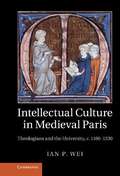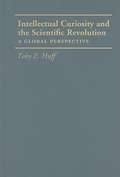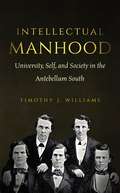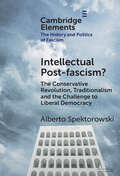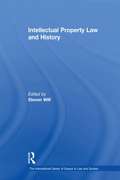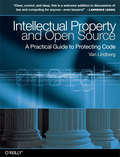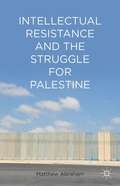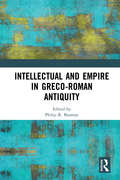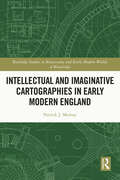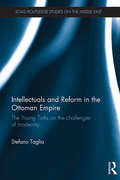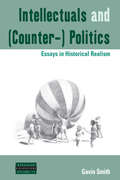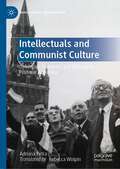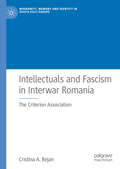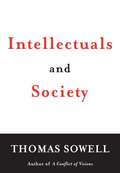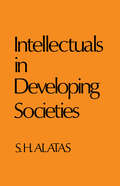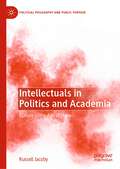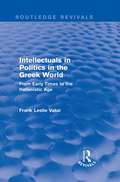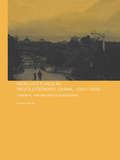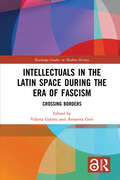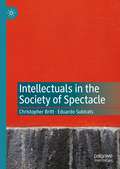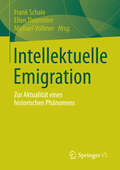- Table View
- List View
Intellectual Culture in Medieval Paris
by Ian P. WeiIn the thirteenth century, the University of Paris emerged as a complex community with a distinctive role in society. This book explores the relationship between contexts of learning and the ways of knowing developed within them, focusing on twelfth-century schools and monasteries, as well as the university. By investigating their views on money, marriage and sex, Ian Wei reveals the complexity of what theologians had to say about the world around them. He analyses the theologians' sense of responsibility to the rest of society and the means by which they tried to communicate and assert their authority. In the late thirteenth and early fourteenth centuries, however, their claims to authority were challenged by learned and intellectually sophisticated women and men who were active outside as well as inside the university and who used the vernacular – an important phenomenon in the development of the intellectual culture of medieval Europe.
Intellectual Curiosity and the Scientific Revolution
by Toby E. HuffSeventeenth-century Europe witnessed an extraordinary flowering of discoveries and innovations. This study, beginning with the Dutch-invented telescope of 1608, casts Galileo's discoveries into a global framework. Although the telescope was soon transmitted to China, Mughal India, and the Ottoman Empire, those civilizations did not respond as Europeans did to the new instrument. In Europe, there was an extraordinary burst of innovations in microscopy, human anatomy, optics, pneumatics, electrical studies, and the science of mechanics. Nearly all of those aided the emergence of Newton's revolutionary grand synthesis, which unified terrestrial and celestial physics under the law of universal gravitation. That achievement had immense implications for all aspects of modern science, technology, and economic development. The economic implications are set out in the concluding epilogue. All these unique developments suggest why the West experienced a singular scientific and economic ascendancy of at least four centuries.
Intellectual Manhood
by Timothy J. WilliamsIn this in-depth and detailed history, Timothy J. Williams reveals that antebellum southern higher education did more than train future secessionists and proslavery ideologues. It also fostered a growing world of intellectualism flexible enough to marry the era's middle-class value system to the honor-bound worldview of the southern gentry. By focusing on the students' perspective and drawing from a rich trove of their letters, diaries, essays, speeches, and memoirs, Williams narrates the under examined story of education and manhood at the University of North Carolina, the nation's first public university.Every aspect of student life is considered, from the formal classroom and the vibrant curriculum of private literary societies to students' personal relationships with each other, their families, young women, and college slaves. In each of these areas, Williams sheds new light on the cultural and intellectual history of young southern men, and in the process dispels commonly held misunderstandings of southern history. Williams's fresh perspective reveals that students of this era produced a distinctly southern form of intellectual masculinity and maturity that laid the foundation for the formulation of the post-Civil War South.
Intellectual Networks in Timurid Iran: Sharaf al-Dīn ʿAlī Yazdī and the Islamicate Republic of Letters (Cambridge Studies in Islamic Civilization)
by İlker Evrim BinbaşBy focusing on the works and intellectual network of the Timurid historian Sharaf al Dīn ʿAlī Yazdī (d. 1454), this book presents a holistic view of intellectual life in fifteenth-century Iran. İlker Evrim Binbaş argues that the intellectuals in this period developed informal networks which transcended political and linguistic boundaries, and spanned an area from the western fringes of the Ottoman state to bustling late medieval metropolises such as Cairo, Shiraz, and Samarkand. Among many others, the network included an Ottoman revolutionary, a Mamluk prophet, a Timurid occultist, as well as physicians, astronomers, devotees of the secret sciences, and those political figures who believed that the network was a force to be taken seriously. Also discussing the formation of an early modern Islamicate republic of letters, this book offers fresh insights into the study of intellectual history beyond the limitations imposed by nationalist methodologies, established genres, and recognized literary traditions.
Intellectual Post-fascism?: The Conservative Revolution, Traditionalism and the Challenge to Liberal Democracy (Elements in the History and Politics of Fascism)
by Alberto SpektorowskiIs the world facing creeping fascism? And if so, how is it configured in contemporary circumstances? A wide-ranging debate has developed in recent years among scholars increasingly worried by the weakness of liberal democracy, and the growing electoral power of national populist movements in Europe. In this account, the rise of the current wave of populism was preceded, and is now accompanied by an important theoretical elaboration, initiated in the 1970's in France by the intellectuals of the Nouvelle Droite and continued by Russian, American and Latin-American intellectuals and political strategists. The theoretical goals of this meta-political elaboration is a reformulation of the values of cultural diversity, identity politics, and post-colonialism, a process which in this Element the author defines as the attempt to decolonize the 'postcolonial Western mind'.
Intellectual Property Law and History (The\international Library Of Essays In Law And Society Ser.)
by Steven WilfIntellectual property has become a dominant feature of our knowledge based economy in recent years, but how has property rights in intangible items developed? This book brings together for the first time exemplary scholarship with diverse approaches to the history of United States intellectual property protection, including trade secrets, trademark, copyright, and patent law. These articles, written by leading experts in the field and often challenging conventional narratives, underscore the importance of historical perspectives for understanding how an extensive, evolving framework for the regulation of knowledge emerged in the modern period. By tracing intellectual property from an historical perspective - not merely providing justifications in philosophy or economics in the abstract - this book draws upon the past to address contemporary debates over such varied topics as: access to knowledge; policing copyright infringement; whether employees should own the products of their minds; the role of national borders in an age of digital information; and the very future of intellectual property as stakeholders and consumers contest the extent of its legal protection.
Intellectual Property and Open Source: A Practical Guide to Protecting Code
by Van Lindberg"Clear, correct, and deep, this is a welcome addition to discussions of law and computing for anyone -- even lawyers!"-- Lawrence Lessig, Professor of Law at Stanford Law School and founder of the Stanford Center for Internet and SocietyIf you work in information technology, intellectual property is central to your job -- but dealing with the complexities of the legal system can be mind-boggling. This book is for anyone who wants to understand how the legal system deals with intellectual property rights for code and other content. You'll get a clear look at intellectual property issues from a developer's point of view, including practical advice about situations you're likely to encounter.Written by an intellectual property attorney who is also a programmer, Intellectual Property and Open Source helps you understand patents, copyrights, trademarks, trade secrets, and licenses, with special focus on the issues surrounding open source development and the GPL. This book answers questions such as:How do open source and intellectual property work together?What are the most important intellectual property-related issues when starting a business or open source project?How should you handle copyright, licensing and other issues when accepting a patch from another developer?How can you pursue your own ideas while working for someone else?What parts of a patent should be reviewed to see if it applies to your work?When is your idea a trade secret?How can you reverse engineer a product without getting into trouble?What should you think about when choosing an open source license for your project?Most legal sources are too scattered, too arcane, and too hard to read. Intellectual Property and Open Source is a friendly, easy-to-follow overview of the law that programmers, system administrators, graphic designers, and many others will find essential.
Intellectual Resistance and the Struggle for Palestine
by Matthew AbrahamIntellectual Resistance and the Struggle for Palestine.
Intellectual and Empire in Greco-Roman Antiquity
by Philip R. BosmanThis volume deals with the interaction between public intellectuals of the late Hellenistic and Roman era, and the powerful individuals with whom they came into contact. How did they negotiate power and its abuses? How did they manage to retain a critical distance from the people they depended upon for their liveli-hood, and even their very existence? These figures include a broad range of prose and poetry authors, dramatists, historians and biographers, philosophers, rhetoricians, religious and other figures of public status. The contributors to the volume consider how such individuals positioned themselves within existing power matrices, and what the approaches and mechanisms were by means of which they negotiated such matrices, whether in the form of opposition, compromise or advocacy. Apart from cutting-edge scholarship on the figures from antiquity investigated, the volume aims to address issues of pertinence in the current political climate, with its manipulation of popular media, and with the increasing interference in the affairs of institutions of higher learning funded from public coffers.
Intellectual and Imaginative Cartographies in Early Modern England (Routledge Studies in Renaissance and Early Modern Worlds of Knowledge)
by Patrick J. MurrayTaking as its focus an age of transformational development in cartographic history, namely the two centuries between Columbus’s arrival in the New World and the emergence of the Scientific Revolution, this study examines how maps were employed as physical and symbolic objects by thinkers, writers and artists. It surveys how early modern people used the map as an object, whether for enjoyment or political campaigning, colonial invasion or teaching in the classroom. Exploring a wide range of literature, from educational manifestoes to the plays of Marlowe and Shakespeare, it suggests that the early modern map was as diverse and various as the rich culture from which it emerged, and was imbued with a whole range of political, social, literary and personal impulses. Intellectual and Imaginative Cartographies in Early Modern England, 1550-1700 will appeal to all those interested in the History of Cartography.
Intellectuals and Reform in the Ottoman Empire: The Young Turks on the Challenges of Modernity (SOAS/Routledge Studies on the Middle East)
by Stefano TagliaThis book uncovers Young Turk political and social ideas at the end of the nineteenth century, during the intellectual phase of the movement. Analysing the life in exile of two of the most charismatic leaders of the Young Turk movement, Ahmed Rıza and Mehmet Sabahattin, the book unravels their plans for the future of the Ottoman Empire, covering issues of power, religion, citizenship, minority rights, the role of the West, and the accountability of the Sultan. The book follows Rıza and Sabahattin through their association with philosophical circles, and highlights how their emphasis on intellectualism and elitism had a twofold effect. On the one hand, seeing themselves as enlightened and entrusted with a mission, they engaged in enduring debates, leaving an important legacy for both Ottoman and Republican rule. On the other hand, the rigidity resulting from elitism and intellectualism prevented the conception of concrete plans for change, causing a schism at the 1902 Congress of Ottoman Liberals and marking the end of the intellectual phase. Using bilingual period journals, contemporary accounts, police archives and political and philosophical treaties, this book is of interest to students, scholars and researchers of Middle East and Ottoman History, and Political Science more broadly.
Intellectuals and (Counter-) Politics: Essays in Historical Realism
by Gavin SmithContemporary forms of capitalism and the state require close analytic attention to reveal the conditions of possibility for effective counter-politics. On the other hand the practice of collective politics needs to be studied through historical ethnography if we are to understand what might make people's actions effective. This book suggests a research agenda designed to maximize the political leverage of ordinary people faced with ever more remote states and technologies that make capitalism increasingly rapacious. Gavin Smith opens and closes this series of interlinked essays by proposing a concise framework for untangling what he calls "the society of capital" and subsequently a potentially controversial way of seeing its contemporary features. This book tackles the political conundrums of our times and asks what roles intellectuals might play therein.
Intellectuals and Communist Culture: Itineraries, Problems, and Debates in Post-war Argentina (Marx, Engels, and Marxisms)
by Adriana PetraThis book investigates a central chapter in the history of 20th century intellectualism: the commitment to the communist ideal and the Soviet Union. Focusing on Argentina, whose communist party was among the most important in Latin America, Petra engages with the current literature on Western communism in order to conduct an exhaustive study of the intellectuals, cultural organizations, publications, and debates within Argentine communism in the decades following World War II. Based on rigorous archival research from diverse sources, Petra’s book distances itself from existing teleological visions and institutional approaches to the communist world, offering instead a complex framework in which multiple contexts, scales, and actors frame the larger problem: the intellectual commitment to a political project that brooked no dissent. Intellectuals and Communist Culture also addresses the emergence of Peronism, a crucial movement in Argentine political life to this very day, thus offering an important chapter on Latin American political and intellectual history and an invaluable contribution to the global history of the international communist movement.
Intellectuals and Fascism in Interwar Romania: The Criterion Association (Modernity, Memory and Identity in South-East Europe)
by Cristina A. BejanIn 1930s Bucharest, some of the country’s most brilliant young intellectuals converged to form the Criterion Association. Bound by friendship and the dream of a new, modern Romania, their members included historian Mircea Eliade, critic Petru Comarnescu, Jewish playwright Mihail Sebastian and a host of other philosophers and artists. Together, they built a vibrant cultural scene that flourished for a few short years, before fascism and scandal splintered their ranks. Cristina A. Bejan asks how the far-right Iron Guard came to eclipse the appeal of liberalism for so many of Romania’s intellectual elite, drawing on diaries, memoirs and other writings to examine the collision of culture and extremism in the interwar years. The first English-language study of Criterion and the most thorough to date in any language, this book grapples with the complexities of Romanian intellectual life in the moments before collapse.
Intellectuals and Society
by Thomas SowellSowell (Hoover Institution, Stanford U. ) issues a right-wing jeremiad against the intelligentsia, the membership of which seems to primarily consist of academics, writers, etc. whose views he finds distasteful. If there is a core argument to the work, it is that intellect does not equal wisdom, that the ideas of intellectuals are not subjected to empirical verifiability, and that intellectuals wield an outsized influence on society that often leads to harmful outcomes (less so, he notes gratefully, in the United States than in Europe, although it is telling that he places the high point of US intellectuals' influence as being in the 1960s and 1970s, an era of greater left influence than later decades). However, this core argument appears to be less of a thesis to be proved than a hook upon which to hang a litany of complaints against ideas that he disagrees with in the realms of economics, social visions, the law, and war. With regards to these complaints, Sowell is frequently less than convincing, as he rarely treats the ideas of his opponents with even a semblance of seriousness. On the very first page, for instance, he argues that Marx's idea that labor is the source of all wealth is disproved because, "if this were true, countries with much labor and little technology or entrepreneurship would be more prosperous than countries with the reverse, when in fact it is blatantly obvious that the direct opposite is the case. " This is such a laughably ridiculous distortion of Marx's theory of labor value that is hard to imagine that any thoughtful reader could possibly take it, or most of the rest of Sowell's similarly-styled arguments, seriously. Those on the right who merely want their political beliefs reinforced may find the work enjoyable however. Annotation ©2011 Book News, Inc. , Portland, OR (booknews. com)
Intellectuals and Society
by Thomas SowellThe influence of intellectuals is not only greater than in previous eras but also takes a very different form from that envisioned by those like Machiavelli and others who have wanted to directly influence rulers. It has not been by shaping the opinions or directing the actions of the holders of power that modern intellectuals have most influenced the course of events, but by shaping public opinion in ways that affect the actions of power holders in democratic societies, whether or not those power holders accept the general vision or the particular policies favored by intellectuals. Even government leaders with disdain or contempt for intellectuals have had to bend to the climate of opinion shaped by those intellectuals. Intellectuals and Society not only examines the track record of intellectuals in the things they have advocated but also analyzes the incentives and constraints under which their views and visions have emerged. One of the most surprising aspects of this study is how often intellectuals have been proved not only wrong, but grossly and disastrously wrong in their prescriptions for the ills of society-and how little their views have changed in response to empirical evidence of the disasters entailed by those views.
Intellectuals and the Search for National Identity in Twentieth-Century Brazil
by Ronald H. ChilcoteThis book discusses twentieth-century Brazilian political thought, arguing that while Rio de Janeiro intellectuals envisaged the state and the national bourgeoisie as the means to overcome dependency on foreign ideas and culture, São Paulo intellectuals looked to civil society and the establishment of new academic institutions in the search for national identity. Ronald H. Chilcote begins his study by outlining Brazilian intellectuals' attempt to transcend a sense of inferiority emanating from Brazilian colonialism and backwardness. Next, he traces the struggle for national identity in Rio de Janeiro through an account of how intellectuals of varying political persuasions united in search of a political ideology of national development. He then presents an analysis by São Paulo intellectuals on racial discrimination, social inequality, and class differentiation under early capitalism and industrialization. Lastly, the book concludes with a discussion on how Brazilian intellectuals challenged foreign thinking about development through the state and representative democratic institutions, in contrast to popular and participatory democratic practices.
Intellectuals in Developing Societies
by Hussein AlatasFirst published in 1977. Routledge is an imprint of Taylor & Francis, an informa company.
Intellectuals in Politics and Academia: Culture in the Age of Hype (Political Philosophy and Public Purpose)
by Russell JacobyThis book addresses the fate of intellectuals in modern culture and politics. Russell Jacoby’s seminal The Last Intellectuals: American Culture in the Age of Academe (1987, 2000) introduced the term “public intellectual” and gave rise to heated controversy. Here Jacoby assesses contemporary public intellectuals, their profound failings and limited achievements. The book includes biting appraisals of well-known intellectuals, such as Noam Chomsky, Hannah Arendt, and Bernard-Henri Lévy, as well as interventions on violence, utopia and multiculturalism.
Intellectuals in Politics in the Greek World: From Early Times to the Hellenistic Age (Routledge Revivals)
by Frank VataiIntellectuals in Politics in the Greek World, first published in 1984, was the first comprehensive study of this recurrent theme in political sociology with specific reference to antiquity, and led to significant revaluation of the role of intellectuals in everyday political life. The term ‘intellectual’ is carefully defined, and figures as diverse as Pythagoras, Plato and Aristotle; Isocrates, Heracleides of Ponteius and Clearchus of Soli are discussed. The author examines the difference between the success of an intellectual politician, like Solon, and the failure of those such as Plato who attempted to mould society to abstract ideals. It is concluded that, ultimately, most philosophers were conspicuously unsuccessful when they intervened in politics: citizens regarded them as propagandists for their rulers, while rulers treated them as intellectual ornaments. The result was that many thinkers retreated to inter-scholastic disputation where the political objects of discussion increasingly became far removed from contemporary reality.
Intellectuals in Revolutionary China, 1921-1949: Leaders, Heroes and Sophisticates (Chinese Worlds)
by Hung-yok IpThis book originally examines how prominent communist intellectuals in China during the revolutionary period (1921 to 1940) constructed and presented identities for themselves and how they narrated their place in the revolution.
Intellectuals in the Latin Space during the Era of Fascism: Crossing Borders (Routledge Studies in Modern History)
by Valeria Galimi Annarita GoriThis volume investigates a galaxy of diverse networks and intellectual actors who engaged in a broad political environment, from conservatism to the most radical right, between the World Wars. Looking beyond fascism, it considers the less-investigated domain of the 'Latin space', which is both geographical and cultural, encompassing countries of both Southern Europe and Latin America. Focus is given to mid-level civil servants, writers, journalists and artists and important 'transnational agents' as well as the larger intellectual networks to which they belonged. The book poses such questions as: In what way did the intellectuals align national and nationalistic values with the project of creating a 'Republic of Letters' that extended beyond each country’s borders, a 'space' in which one could produce and disseminate thought whose objective was to encourage political action? What kinds of networks did they succeed in establishing in the interwar period? Who were these intellectuals-in-action? What role did they play in their institutions’ and cultural associations’ activities? A wider and intricate analytical framework emerges, exploring right-wing intellectual agents and their networks, their travels and the circulation of ideas, during the interwar period and on a transatlantic scale, offering an original contribution to the debate on interwar authoritarian regimes and opening new possibilities for research.
Intellectuals in the Latin Space during the Era of Fascism: Crossing Borders (Routledge Studies in Modern History)
by Valeria Galimi Annarita GoriThis volume investigates a galaxy of diverse networks and intellectual actors who engaged in a broad political environment, from conservatism to the most radical right, between the World Wars. Looking beyond fascism, it considers the less-investigated domain of the 'Latin space', which is both geographical and cultural, encompassing countries of both Southern Europe and Latin America. Focus is given to mid-level civil servants, writers, journalists and artists and important 'transnational agents' as well as the larger intellectual networks to which they belonged. The book poses such questions as: In what way did the intellectuals align national and nationalistic values with the project of creating a 'Republic of Letters' that extended beyond each country’s borders, a 'space' in which one could produce and disseminate thought whose objective was to encourage political action? What kinds of networks did they succeed in establishing in the interwar period? Who were these intellectuals-in-action? What role did they play in their institutions’ and cultural associations’ activities? A wider and intricate analytical framework emerges, exploring right-wing intellectual agents and their networks, their travels and the circulation of ideas, during the interwar period and on a transatlantic scale, offering an original contribution to the debate on interwar authoritarian regimes and opening new possibilities for research.
Intellectuals in the Society of Spectacle
by Christopher Britt Eduardo SubiratsThis book reveals the sense in which our postmodern societies are characterized by the obscene absence of the intellectual. The modern intellectual--who had once been associated with humanism and enlightenment—has in our day been replaced by media stars, talking heads, and technical experts. At issue is the ongoing crisis of democracy, under the aegis of the société du spectacle and its vast networks of politically-induced idiocy, industrially-produced biocide, and militarily-provoked genocide. Spectacle fills the resulting moral and intellectual vacuum with electronic technologies of control, punishment, and destruction. This postmodern tyranny reduces intelligence to mechanistic, positivist, and grammatological models of inquiry, while increasing the segmentation, fragmentation, and dissolution of human existence. The apotheosis of the spectacle explains the intellectual void that lies at the heart of our postmodern decadence; it also accounts for the need to recuperate the humanist values of enlightenment promoted by the modern intellectual tradition.
Intellektuelle Emigration
by Frank Schale Michael Vollmer Ellen ThümmlerEine Intellektuellengeschichte des 20. Jahrhunderts muss die geistigen Einflüsse deutscher Wissenschaftsemigranten zwischen 1933 und 1945 berücksichtigen. Zu einschneidend prägte sie das literarische, kulturelle und politische Denken diesseits und jenseits des Atlantiks. Aus einem breiten Verständnis von Ideengeschichte heraus werden nicht nur prominente Emigranten wie Hannah Arendt, Arnold Bergstraesser und Franz L. Neumann, sondern zugleich dem drohenden Vergessen anheim fallende Flüchtlinge wie Sigmund Neumann, Ferdinand Hermens und Otto Neurath oder bisher kaum beachtete Biographien von André Gorz und Romain Rolland vorgestellt. Einerseits rekonstruieren die Beiträge die dramatischen Lebenslinien sowie die oft unter beklemmenden Bedingungen angefertigten politischen, gesellschafts-, kultur- und wissenschaftstheoretischen Arbeiten. Andererseits wagen sie auch einen Blick auf die Perspektiven der Emigrationsforschung heute.
